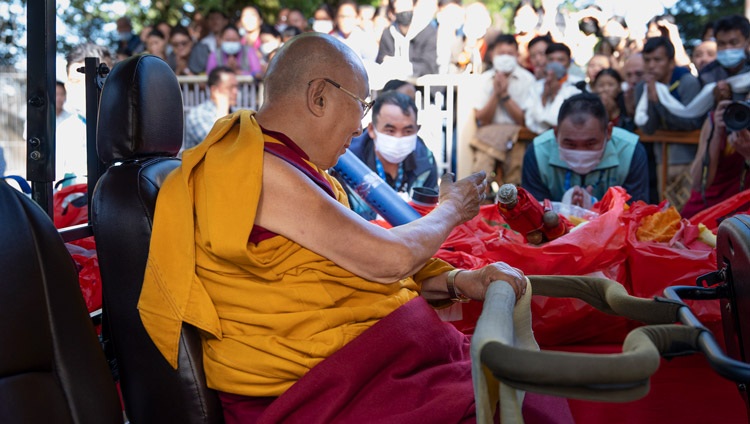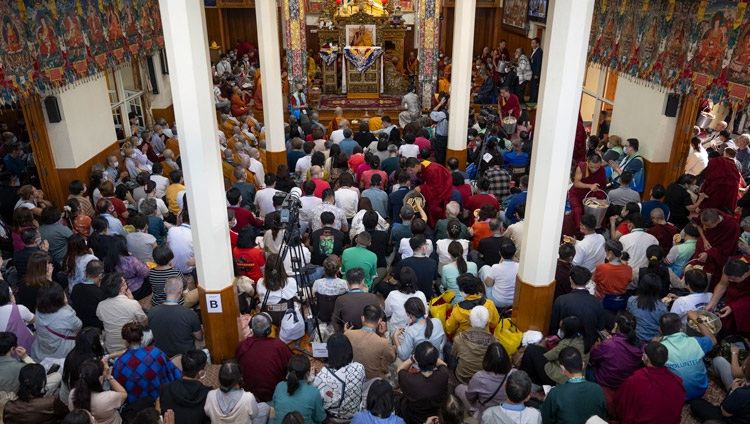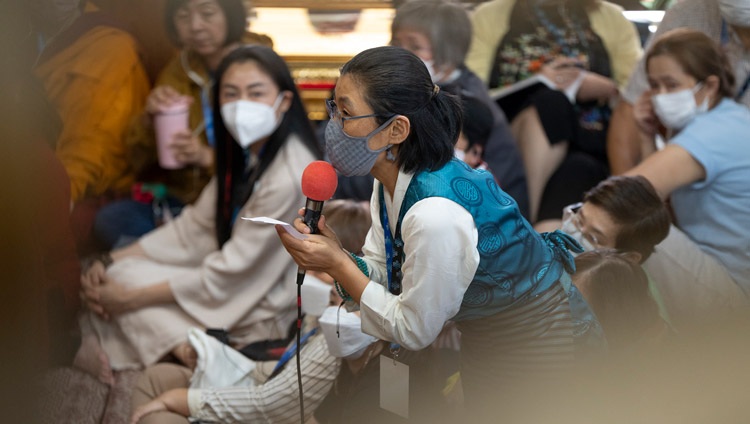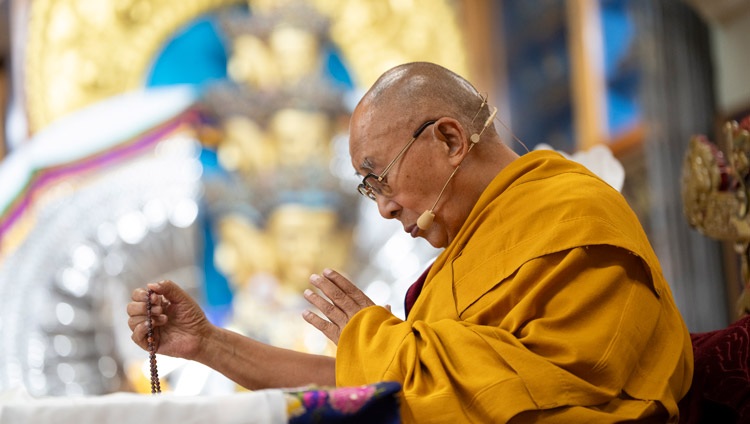Thekchen Chöling, Dharamsala, HP, India - Riding in a golf-cart from his residence to the Tsuglagkhang, the Main Tibetan Temple, and then walking from the lift to the temple, His Holiness the Dalai Lama smiled broadly, happy to see the people gathered to hear him teach. Of the estimated 5000 people present, 700 were from the following South-east Asia countries: Singapore, Malaysia, Indonesia, Thailand, Vietnam, Bangladesh and Laos.

As soon as His Holiness was settled on the throne, a group of Theravada monks chanted a Homage to the Three Jewels (Triratna Vandana) in Pali. This was followed by a recitation of the ‘Heart Sutra’ in Tibetan and the salutation verses from ‘Ornament for Clear Realizations’ and ‘Fundamental Wisdom of the Middle Way’. Tea and bread were served.
“I’ve been living here in Dharamsala since coming into exile,” His Holiness began. “Today, among those gathered here some have a long-standing faith in the teaching of the Buddha, others have no historical connection with it. People can’t be forced to take an interest in the Dharma. It’s something you think about and develop an interest in. For example, in China today more and more people appreciate what the Buddha taught because it gives rise to peace of mind. This occurs not as a result of faith or repeating prayers, but due to analytical thought.
“Among my friends are scientists, who admire Buddhist teachings because they are based on logic and reason. They are attracted by the extensive explanations of the workings of the mind and emotions and methods for achieving peace of mind. In places where Buddhism was historically not well known, there is growing interest, not so much in rituals and prayers, but in using the mind to achieve inner peace.
“The Nalanda Tradition examined the mind and emotions and established what disturbs our peace of mind. It developed techniques to counter the destructive emotions. All the world’s religious traditions convey advice that is of help and benefit to humanity. But Buddhism also contains psychological insight that enables us to transform our minds. The key is to understand how our minds and emotions work and in this very life to reduce destructive emotions like anger and jealousy.
“The purpose of the Buddha’s teaching is to reduce negative states of mind. It’s not about faith, but bringing about change. The Buddha became enlightened at Bodhgaya and subsequently taught the Four Noble Truths. These describe the general structure of his teaching. When it came to the second turning of the wheel of Dharma he taught the Perfection of Wisdom, instructions to be viewed in the light of reason. I can say that because the Buddha’s teaching is based on reason and logic, it has the potential to benefit the whole world.

“The moment I wake in the morning, I think about the awakening mind of bodhichitta and emptiness. Indian masters have written about these things. What’s more, many Indian masters came to Tibet to teach and many Tibetans came to India to learn. Consequently, we received the transmission of the Buddha’s entire teaching, which we have preserved and can now share with the world. And, as I’ve already said, we are able to hold discussions with scientists because the Buddha’s teachings are rooted in logic and reason.
“In his initial teaching the Buddha revealed the Four Truths—the truth of suffering, the truth of the origin of suffering, the truth of cessation and the truth of the path. These entail comprehensive instructions for achieving peace of mind. I am an ordinary follower of the Buddha who has found his teaching to be helpful to me. Therefore, I ask you, my Dharma brothers and sisters to keep in mind that the teaching involves more than mere ritual. It entails methods for bringing about inner peace by cultivating a genuine concern for others.”
Members of the audience took the opportunity to ask His Holiness questions. The first concerned the essence of Buddhism. His Holiness told the questioner that it’s about having a good heart and helping others rather than doing them harm. Next His Holiness was asked how to develop compassion and empathy in a stressful world. He replied that if you understand the teaching of the Buddha, when you face hardship, you will be able to employ techniques to counter your negative emotions. He was quite clear that cultivating love and compassion enables us to calm our minds.
Answering a question about the importance of emptiness in Tibetan Buddhism His Holiness stated that it is because Buddhist practice involves training and controlling our minds. He said there are two ways to approach this. One depends on faith, the other relies on wisdom.

“Usually, we regard an adversary as someone who exists objectively from their own side. When we are able to see that people and things that do us harm do not exist as they appear to do, but exist only as designations, our anger and hostility is reduced. Although things appear to exist objectively and independently, when you understand that in fact neither persons nor things exist in that way, it really helps us to reduce anger and animosity.
“I have clear personal experience of this since I meditate on emptiness every day. It is helpful to me. When we see things and consider that they exist objectively from their own side, we stoke our negative emotions. But when we realize that people and things do not exist as they appear, it helps us diminish our negative responses to them.”
Finally, His Holiness was asked to explain what he means when he encourages people to become 21st century Buddhists. He mentioned that there are so many things that we can learn, but most important are the methods we can use to cultivate a relaxed state of mind. The awakening mind of bodhichitta and an understanding emptiness are really helpful when it comes to dispelling our mental turmoil. Understanding how things actually exist and cultivating a genuine sense of compassion will bring about peace of mind.
Conditions may be adverse, but you can turn them in your favour. Buddhism, His Holiness observed, is not just a matter of having faith in the three jewels, it’s about examining things in the light reason and logic and generating peace of mind, which in turn contributes to creating peace in the world. This is like taking a scientific approach and if you can do that, you’ll be a 21st century Buddhist.
His Holiness announced that he would give the oral transmission of the six-syllable mantra of Avalokiteshvara, Om mani padme hung. He noted that people recite this from childhood throughout the three provinces of Tibet. When you feel mentally disturbed, he said, it helps you calm your mind.

His Holiness recited a praise to Avalokiteshvara before leading the congregation in repeating the mantra:
Avalokiteshvara, your thousand hands represent one thousand universal monarchs
our thousand eyes represent the thousand Buddhas of this fortunate aeon,
You who appear to different sentient beings according to their disposition,
Venerable Avalokiteshvara I pay homage to you.
The recitation concluded:
By the virtue of having recited this mantra
May I attain the state of Avalokiteshvara
and may I lead others to the very same state.
As he walked from the temple to the lift and then boarded the golf-cart that would take him home, His Holiness ran his gaze over the crowd, smiling and waving as he went.












